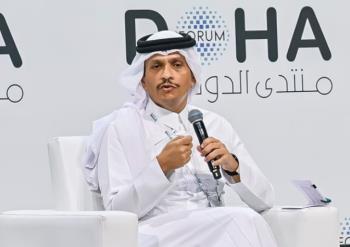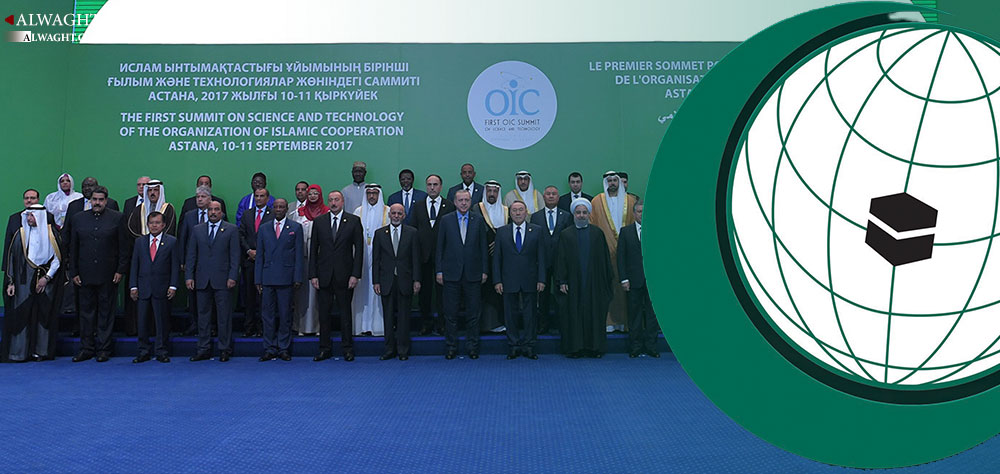Alwaght- The US embassy relocation to Al-Quds (Jerusalem) has been a very important development drawing regional and international focus to the Trump administration’s move. When in early December last year the US President Donald Trump said he recognized al-Quds as the Israeli capital and intended to move his country’s embassy to the holy Muslim city, he faced a big backlash from a majority of the Muslim states. Even the United Nations body overwhelmingly expressed its opposition to the US leader’s measure. After May 14, the day the US relocated its diplomatic mission to al-Quds, the Muslims’ anger boiled over. The leaders of the Muslim nations met in Istanbul, Turkey on Friday to reject the illegal US step and discuss ways of unanimously responding to Washington’s highly destabilizing action.
The leaders’ summit took place while on the relocation day the Israeli forces killed 62 and injured over 2,700 Palestinians who gathered on the besieged Gaza border with the occupied territories to protest the American move and highlight, through the Great March of Return, their right to return to their occupied lands. After the Trump December announcement, the Palestinians fell victim to the behind-the-scenes compromises of the leaders of some of the Arab states such as Saudi Arabia, the United Arab Emirates, and Bahrain to the Israelis and the Americans in the Palestinian case. The pro-Western regimes in secret talks gave the US administration a green light for its step and so Palestine and its people’s rights were abused as a dealing material by a number of Arab monarchies—mainly without political and democratic legitimacy— which received the US protection promise and made concessions on Palestine.
With all these in mind and with the urgent need of the Palestinians for international support especially from the Muslim governments, the emergency meeting of the Organization of Islamic Cooperation (OIC) becomes of great significance.
In the summit, called for by the President Recep Tayyip Erdogan of Turkey whose country currently leads the Muslim bloc, the participants issued a 30-article statement condemning in the strongest terms the “savage crimes” of Israeli forces against the Palestinian people in the “Occupied Palestinian Territory”, particularly in the Gaza Strip, where unarmed Palestinian civilians were exercising their legitimate right of peaceful protest against this “inhumane and absolutely illegal” occupation.
Many analysts argue that the US action can work as a trigger breaking the several-decade ice of the biggest collective Muslim cooperation bloc to make more influential decisions to prevent more Israeli violations against the Palestinians’ rights in al-Quds, the first Muslim Qiblah, fixed direction toward which Muslims faced when saying prayers since 624 when the direction oriented towards Kaaba in Mecca.
Because the essential goal of the OIC, comprised of 57 states from four continents and founded in 1969 in Rabat, Morocco, has been to protect al-Quds after an arson attack by a hardline Christian, Denis Michael Rohan, on the holy Al-Aqsa Mosque in the same year. But guarding the Muslim city against the Israeli occupation needs adjuncts. Three of them follow here:
Broadly defending the Palestinian rights in the face of occupation
A Muslim states’ positive and collective response to the US embassy move should be reflected in their united pro-Palestinian stance. A strong stance in solidarity with Palestine should be unharmed by intra-Muslim disputes and differences. The fact is that it is no use if the summit remains solely a summit in words. Rather, the states need to take practical actions in broad levels in defense of the Palestinian cause. The Palestinian cause can also stand center to a serious and genuine front gathering together the Muslim countries. Therefore, the new situation necessitates wider pro-Palestinian patronage by the Muslim world.
Practical steps
The Muslim cooperation bloc needs a transition from simple verbal promises to practical steps to safeguard the Palestinians against the Israeli oppression and crimes that are taking place on a regular basis. The practical steps should focus on diplomatic and economic instruments. A laudable anti-Israeli diplomatic step was the Turkish expulsion of the Israeli consul in Ankara in response to the Gaza killings. The move can represent a good example to some regional Arab states that are preparing grounds to naturalize relations with the Israeli regime. The Muslim governments should halt their secret games, dealings, and relations with Tel Aviv and Washington. More work should be pressuring the US diplomatically and forming a united front against the Israeli regime at the UN and other international bodies. Some Arab states need to cease trumpeting slogans that are impractical out on the ground and are just aimed for domestic consumption, as the Palestinian cause now more than any other time requires serious and firm resolve of the Muslims. One viable reaction should be halting the US products importation and reducing the diplomatic relations level with Washington. This will send a very powerful message of the Muslim discontentment with US embassy relocation and the condemnation of the Israeli massacre.
Unwavering support, non-provisional summits
Another important issue surrounding the Palestinian case is that the OIC should have the Palestinians’ back constantly and hold meetings in their cause’s support regularly. If the Muslim bloc only temporarily focuses on the Palestinian plights and speak against the ongoing Israeli barbarity against the Palestinian people, then over time the solidarity for the core cause of the Muslim world will lose luster, which means al-Quds could lose the urgent backing and be forgotten. On the other side, the Israeli regime will be emboldened and firm in pressing ahead with its anti-Palestinian atrocities and massacres. With these in mind, building a constant, unconditional umbrella platform for the Palestinians’ right to restore their land until pro-liberation efforts come into fruition is a must for the Organization of Islamic Cooperation.
Alwaght- The US embassy relocation to Al-Quds (Jerusalem) has been a very important development drawing regional and international focus to the Trump administration’s move. When in early December last year the US President Donald Trump said he recognized al-Quds as the Israeli capital and intended to move his country’s embassy to the holy Muslim city, he faced a big backlash from a majority of the Muslim states. Even the United Nations body overwhelmingly expressed its opposition to the US leader’s measure. After May 14, the day the US relocated its diplomatic mission to al-Quds, the Muslims’ anger boiled over. The leaders of the Muslim nations met in Istanbul, Turkey on Friday to reject the illegal US step and discuss ways of unanimously responding to Washington’s highly destabilizing action.
The leaders’ summit took place while on the relocation day the Israeli forces killed 62 and injured over 2,700 Palestinians who gathered on the besieged Gaza border with the occupied territories to protest the American move and highlight, through the Great March of Return, their right to return to their occupied lands. After the Trump December announcement, the Palestinians fell victim to the behind-the-scenes compromises of the leaders of some of the Arab states such as Saudi Arabia, the United Arab Emirates, and Bahrain to the Israelis and the Americans in the Palestinian case. The pro-Western regimes in secret talks gave the US administration a green light for its step and so Palestine and its people’s rights were abused as a dealing material by a number of Arab monarchies—mainly without political and democratic legitimacy— which received the US protection promise and made concessions on Palestine.
With all these in mind and with the urgent need of the Palestinians for international support especially from the Muslim governments, the emergency meeting of the Organization of Islamic Cooperation (OIC) becomes of great significance.
In the summit, called for by the President Recep Tayyip Erdogan of Turkey whose country currently leads the Muslim bloc, the participants issued a 30-article statement condemning in the strongest terms the “savage crimes” of Israeli forces against the Palestinian people in the “Occupied Palestinian Territory”, particularly in the Gaza Strip, where unarmed Palestinian civilians were exercising their legitimate right of peaceful protest against this “inhumane and absolutely illegal” occupation.
Many analysts argue that the US action can work as a trigger breaking the several-decade ice of the biggest collective Muslim cooperation bloc to make more influential decisions to prevent more Israeli violations against the Palestinians’ rights in al-Quds, the first Muslim Qiblah, fixed direction toward which Muslims faced when saying prayers since 624 when the direction oriented towards Kaaba in Mecca.
Because the essential goal of the OIC, comprised of 57 states from four continents and founded in 1969 in Rabat, Morocco, has been to protect al-Quds after an arson attack by a hardline Christian, Denis Michael Rohan, on the holy Al-Aqsa Mosque in the same year. But guarding the Muslim city against the Israeli occupation needs adjuncts. Three of them follow here:
Broadly defending the Palestinian rights in the face of occupation
A Muslim states’ positive and collective response to the US embassy move should be reflected in their united pro-Palestinian stance. A strong stance in solidarity with Palestine should be unharmed by intra-Muslim disputes and differences. The fact is that it is no use if the summit remains solely a summit in words. Rather, the states need to take practical actions in broad levels in defense of the Palestinian cause. The Palestinian cause can also stand center to a serious and genuine front gathering together the Muslim countries. Therefore, the new situation necessitates wider pro-Palestinian patronage by the Muslim world.
Practical steps
The Muslim cooperation bloc needs a transition from simple verbal promises to practical steps to safeguard the Palestinians against the Israeli oppression and crimes that are taking place on a regular basis. The practical steps should focus on diplomatic and economic instruments. A laudable anti-Israeli diplomatic step was the Turkish expulsion of the Israeli consul in Ankara in response to the Gaza killings. The move can represent a good example to some regional Arab states that are preparing grounds to naturalize relations with the Israeli regime. The Muslim governments should halt their secret games, dealings, and relations with Tel Aviv and Washington. More work should be pressuring the US diplomatically and forming a united front against the Israeli regime at the UN and other international bodies. Some Arab states need to cease trumpeting slogans that are impractical out on the ground and are just aimed for domestic consumption, as the Palestinian cause now more than any other time requires serious and firm resolve of the Muslims. One viable reaction should be halting the US products importation and reducing the diplomatic relations level with Washington. This will send a very powerful message of the Muslim discontentment with US embassy relocation and the condemnation of the Israeli massacre.
Unwavering support, non-provisional summits
Another important issue surrounding the Palestinian case is that the OIC should have the Palestinians’ back constantly and hold meetings in their cause’s support regularly. If the Muslim bloc only temporarily focuses on the Palestinian plights and speak against the ongoing Israeli barbarity against the Palestinian people, then over time the solidarity for the core cause of the Muslim world will lose luster, which means al-Quds could lose the urgent backing and be forgotten. On the other side, the Israeli regime will be emboldened and firm in pressing ahead with its anti-Palestinian atrocities and massacres. With these in mind, building a constant, unconditional umbrella platform for the Palestinians’ right to restore their land until pro-liberation efforts come into fruition is a must for the Organization of Islamic Cooperation.



























